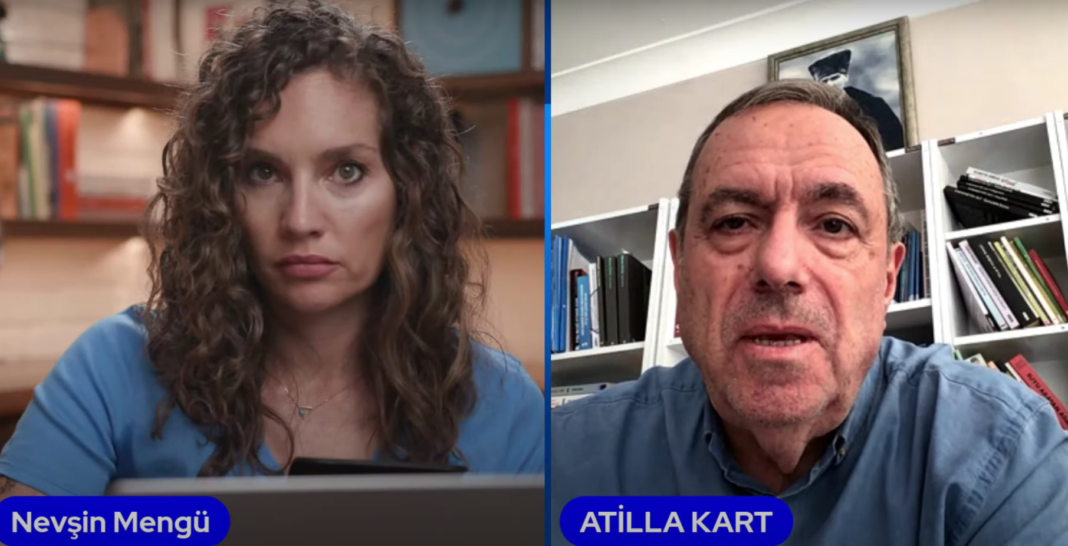A former lawmaker for the Republican People’s Party (CHP) shed light on what he termed a traumatic experience that saw him prevented from representing the CHP before the European Court of Human Rights (ECtHR) to contest the results of the 2017 constitutional referendum, which gave Turkish President Recep Tayyip Erdoğan sweeping powers by changing the country’s system of governance to an executive presidency, in a YouTube interview conducted by journalist Nevşin Mengü on Monday.
At the time the main opposition CHP challenged the results of the referendum on the grounds that Turkey’s top election authority had issued a controversial ruling on the day of the vote to accept ballots in envelopes not bearing official polling station stamps. The OSCE report at the time criticized the decision as “undermining an important safeguard and contradicting the law.” The decision raised concerns about the potential for ballot stuffing and undermined confidence in the results.
Kart revealed that he was originally tasked by the party to legally address the matter and had compiled a substantial dossier comprising a 45-page petition along with 250 pages of annexes. Despite securing an appointment at the ECtHR, he was urged to lodge the application individually, not on behalf of the CHP, a directive that came from high-ranking party officials Haluk Koç and Tekin Bingöl, conveying a message from the party leader, Kemal Kılıçdaroğlu. This sudden shift, Kart said, significantly undermined the case by removing the substantial backing of the party.
In the wake of this development, Kart recounted the experience as being deeply hurtful and criticized the CHP leadership’s passive response to the serious allegations concerning the referendum’s integrity, denouncing it as a stark violation of the electoral process. He took the matter to the ECtHR as an individual. However, he observed that court officials were under the impression that he was representing the CHP, showing surprise upon learning it was a personal appeal.
During the detailed discussion, Kart recalled being granted the authority to represent the party in challenging the Supreme Election Council (YSK) decision to accept unsealed ballots. He said this issue was a serious violation that warranted urgent redress.
Kart described a meticulous preparation process that spanned 45 days, culminating in a robust 45-page petition bolstered by 250 supporting documents. His effort aimed to expedite the case that otherwise could have taken eight to 10 months to compile. Despite initially receiving Kılıçdaroğlu’s blessing and having his travel arrangements made for the court appointment in Strasbourg, Kart recounted receiving phone calls from party officials Koç and Bingöl just a day prior, instructing him to apply as an individual instead.
Kart pressed on with his personal-capacity presentation at the ECtHR, noting the court officials’ expectation for the case to bear the CHP’s weight. This turn of events severely diminished the case’s impact as it lacked the formal backing of the party.
In 2017 Turkey held a constitutional referendum where a number of key amendments were proposed, shifting the nation from a parliamentary government to a presidential system, concentrating executive power in the hands of the president. This was followed by a general election in 2018, where both presidential and parliamentary positions were contested. These two events have been under scrutiny due to allegations of electoral malpractice, which raised national and international concerns.
A 2018 forensic analysis of the 2017 referendum and the 2018 general election utilized statistical procedures to examine potential fraudulent activities, such as ballot stuffing and voter rigging. The study found statistically significant indications of such activities during both events, suggesting potential biases in the Turkish electoral system that may have altered the outcomes, favoring the “yes” vote in the 2017 referendum and influencing results in 2018 to a certain extent.
However, it should be noted that these results are indicative rather than conclusive, illustrating compatibility with the occurrence of fraud but not establishing direct evidence. The paper calls for a more comprehensive investigation to substantiate the findings while also highlighting the potential to predict geographic regions with a higher likelihood of electoral malpractice in future elections.
The findings draw parallels with concerns raised by election observers and reports in the past, emphasizing a recurring pattern of irregularities and pointing to the necessity for in-depth examinations to uphold democratic processes in Turkey.



